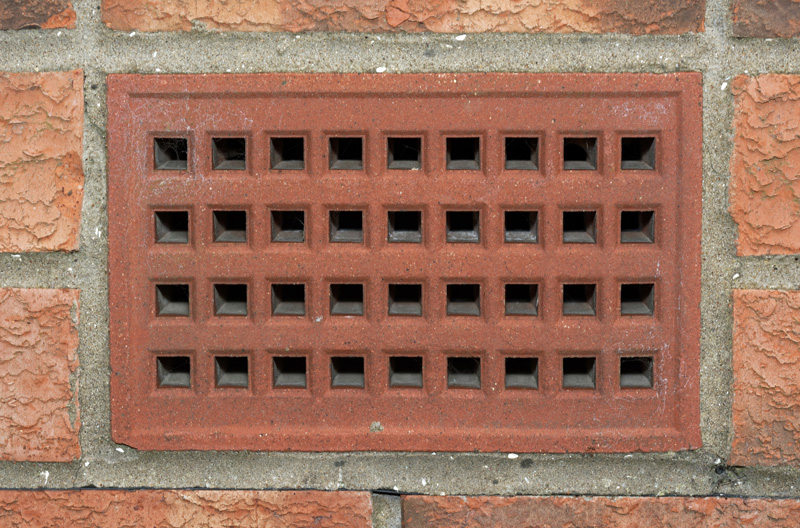Posted: 9th March 2023 | Author: Jamie Brown | Category: Ventilation
Back to news
Does your home have a suspended floor or cavity walls? If so, it’s likely that you already have air bricks installed. If you’ve not come across them before, you might not even be aware that they’re there.
But what actually are air bricks, how do they work, and what are they used for?
Read on to find out, as we’ve put together a handy guide covering everything you need to know about air bricks. This includes their importance for keeping your home properly ventilated.
An air brick is a specialist type of brick designed to provide ventilation for cavity walls and suspended floors. They should be very easy to recognise, as they have evenly spaced holes. Walk outside your property and you may find them near the bottom of the external wall, surrounded by ordinary bricks.
Generally speaking, air bricks are installed around 75mm above ground level. Although if the ground level has risen, due to landscaping or other external works, the air bricks may have ended up closer to the ground.
Air bricks can be made of a few different materials, and there are lots of styles and varieties out there. In older properties, you might find air bricks made of clay - which was a traditional material used to make air bricks. You can still find clay air bricks, which is useful if you have a period property and want to match the style of brick.
Modern air bricks tend to be made of PVC plastic. The holes in air bricks can be round, square or rectangular. It’s more common to see the latter two - rectangular or square - in air bricks used today.
Air bricks play a critical role in underfloor ventilation. When installed in external walls, they allow air from outside to circulate through cavity walls and subfloor structures. They’re particularly useful in properties with suspended floors, which is where there’s a void beneath the floor.
This airflow is essential for preventing the build-up of moisture within these cramped spaces. By providing a way for cold or damp air to escape and encouraging air to circulate, air bricks make it less likely that your property will suffer from damp problems. This includes preventing damp and rot which could affect timber floorboards and joists.
Air bricks are also useful in properties with central heating, which is most homes in the UK today. At night, when your heating is off, your home will start to cool. When your floorboards and joists become cooler than the moist air around them, it’s possible for water to condense on them. Without a means for this moisture to escape, there’s a risk that your timbers could start to rot.
For air bricks to be effective though, it’s important to keep on top of maintenance. Over time, it’s possible for them to become blocked by leaves, soil, dust or spiderwebs. If you’ve had any repointing or building work done, you’ll need to be careful that your air bricks haven’t been blocked by mistake.
And on a reasonably regular basis, you’ll want to check your air bricks for blockages and clean away any debris, as this could prevent air from passing through the brick.
In some cases, property owners block air bricks deliberately. This can happen for a few reasons, including concerns over draughts, or worries about the entry of mice and pests into the property.
It can also happen accidentally. For example, the homeowner may be installing insulation and pack it too tightly into the cavity wall. Alternatively, they might build an extension on the wall where the air bricks are installed, either making them internal or removing them altogether.
It’s really important that air bricks remain unblocked. Without a steady, unobstructed airflow, you could risk problems with damp, condensation and rot within your walls and floors.
Air bricks can deliver many benefits, especially in homes with suspended floors and/or cavity walls. Here are just a handful of the advantages they offer:
So if your property doesn’t have many or any air bricks, or it has air bricks, but they’re blocked, it could be well worth installing new ones.
However, it’s a good idea to speak to a damp and ventilation specialist to get tailored advice. Not every property is suitable for air bricks, and they don’t always work in combination with some types of energy efficiency measures.
Back to news
The Author: Jamie Brown
From my early working life as a labourer, then becoming a builder and a property developer, I have been buying and using building materials for over 25 years. I set about to start a builders merchant which can offer high-quality products and significant savings along with speedy delivery to keep your sites moving. Still having a foot in the construction industry on my own property, I always make sure the products we sell are up to our high standards which is important for us to keep a great image for the company and superior reputation to supply quality!